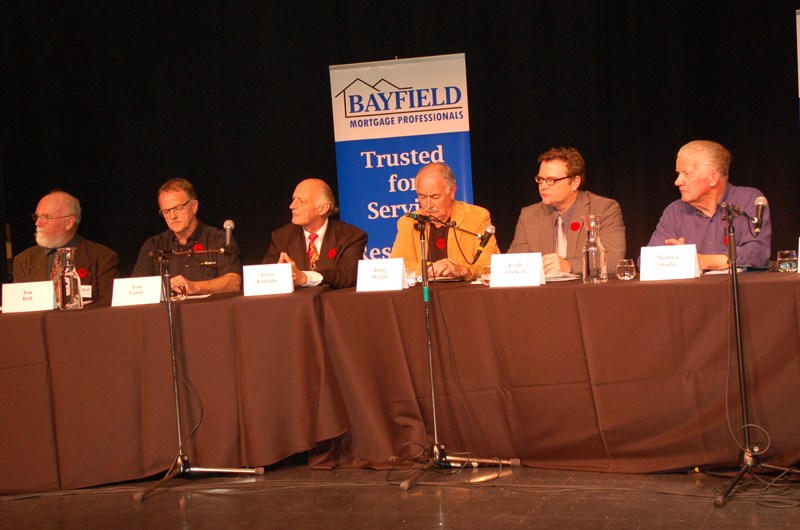Sechelt council candidates answered questions about transparency at municipal hall, economic development and having the municipality shop locally during an all-candidates meeting organized by the Sechelt and District Chamber of Commerce on Nov. 6.
The issue of transparency got the candidates talking, with incumbent Darnelda Siegers stating council could have handled the wastewater treatment plant consultation process better.
“I have to say that the process that we followed for the wastewater treatment plant initially was not inclusive of the public and it tainted this whole term for council,” Siegers said. “So even though we’ve implemented some additional communications and strategies and meetings and things the last while, it hasn’t actually changed the public’s perception of the information that’s coming out from council. So we do have to do a better job of that.”
To combat the issue, candidate Terry Karkabe suggested televising or live streaming future meetings to help the public become more informed.
Incumbent Alice Lutes said streaming meetings was a good idea, but added it doesn’t count as consultation with the public.
She suggested having council liaisons attend community association meetings again and bringing back the question and answer period at the beginning of council meetings.
“I think that would help the community to have some involvement,” Lutes said.
Darren Inkster said more informal meetings would help, such as town hall meetings and mornings with the mayor.
“Providing more opportunities for the public to participate is important,” he said.
Ed Steeves said fewer in-camera meetings would make a difference, noting there were only three reasons for council to go in camera: “land, legal or labour.”
Norm Blair pushed for decisions to be made in public whenever possible, and added, “We can find ways to do it that doesn’t slow the process.”
On the issue of economic development, Christine Stefanik said it was her top platform issue.
“There’s three components to this. There’s business retention and expansion and there’s attraction for businesses coming into Sechelt, and we must retain our youth with this as well. Without a vibrant, active economy that we contribute and add to, we are not a functioning community,” Stefanik said, noting that shopping locally was a good place to start.
Inkster suggested cultivating educational opportunities in trades or health care as a way to help train youth for well paying jobs available locally.
“If people have money locally, they will spend it in local businesses,” Inkster added.
Jon Bell said increasing tourism could stimulate the economy and he also pointed to jobs for all ages as a need on the Coast.
“It’s not just the youth who are looking for jobs. It’s right across [every] sector of our community. Many, many people including the seniors need jobs,” he said.
Noel Muller had strong opinions on what Sechelt could do to encourage economic development.
“Essentially for us right now we have a choice, and it’s only one choice where we can bring value added to our economy and that means skilled workers, efficient work places and goods that have a customer,” Muller said.
Incumbent Tom Lamb said partnering with the Sechelt Indian Band could have “huge unknown” economic potential for Sechelt. Blair suggested tax breaks for local businesses could encourage owners to hire more workers, stimulating the economy.
Steeves called for an economic development officer to help Sechelt address the issue, and Doug Wright said it was important to market Sechelt to potential investors.
“We need to market the fact that we’re open for business, to any business that wants to move here,” he said.
On the question of how to help local companies better compete for projects with the District of Sechelt, Lamb said business owners should let the District know what they can offer before projects come up.
“I believe that’s something that’s missing,” Lamb said, suggesting the District keep an inventory of products and services available locally.
Keith Thirkell suggested the District favour local companies over off-Coast companies via a “bid-spread of five per cent or 10 per cent” when awarding contracts.
Incumbent Mike Shanks pointed to Gibsons as a town that shops locally, noting a policy can be made.
Stefanik said that if she was elected, she would call for a “Sechelt first policy,” that would see local companies used whenever possible.



